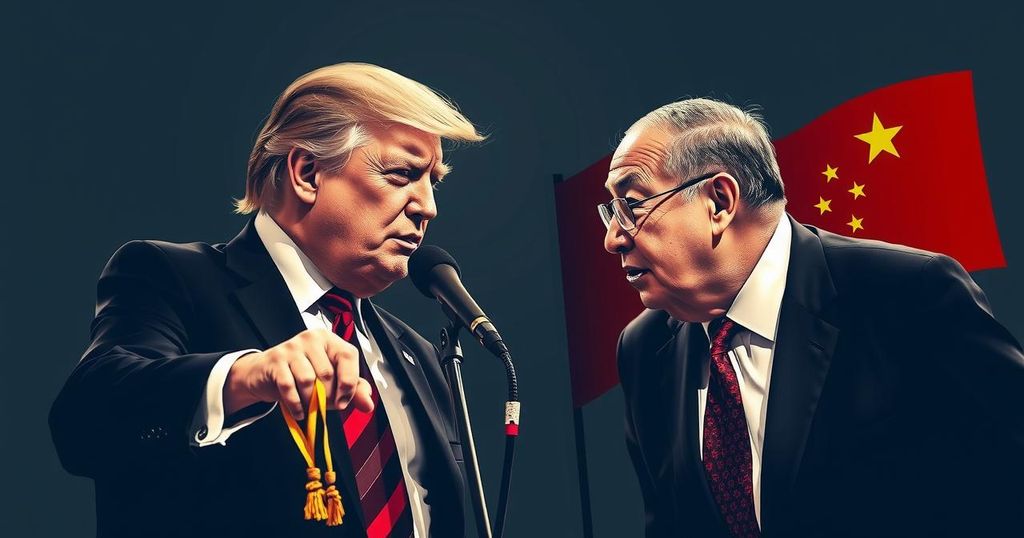Donald Trump’s warning of a 100% tariff on BRICS nations aims to prevent the establishment of a rival currency to the U.S. dollar. The BRICS nations seek to lessen their dependence on the dollar, but creating a viable alternative presents significant challenges. Tariffs could lead to higher consumer prices in the U.S., prompting criticism that such actions may weaken the dollar’s global status.
Former President Donald Trump has issued a stark warning to the BRICS nations, threatening to impose a 100% tariff on goods from these countries if they pursue plans to establish a new currency to rival the United States dollar. The BRICS countries, which include Brazil, Russia, India, China, South Africa, Egypt, Ethiopia, Iran, and the United Arab Emirates, aim to reduce their dependence on the U.S. dollar, currently the dominant global reserve currency. Trump stated, “We require a commitment from these countries that they will neither create a new BRICS currency, nor back any other currency to replace the mighty U.S. dollar, or they will face 100% tariffs.” This threat comes on the heels of previous tariff suggestions aimed at Canada, Mexico, and China, framed as leverage to incentivize these nations to address issues like illegal immigration and drug trafficking.
The genesis of the BRICS group dates back to 2009, when it was formed to bolster the interests of emerging economies and limit their reliance on the dollar. The dollar’s entrenched position in international trade bestows significant advantages upon the U.S., including favorable borrowing conditions and substantial geopolitical influence. Current discussions among BRICS leaders indicate a desire for financial autonomy, with Russian President Vladimir Putin stating that “the dollar is being used as a weapon,” while Brazilian President Luiz Inácio Lula da Silva advocates for a new common currency for South America to further diminish dollar dependency.
However, the creation of a BRICS currency poses substantial challenges. The U.S. dollar accounts for about 58% of global foreign exchange reserves, making it a formidable competitor for any emerging currency. Economists like Mark Weinstock assert that the economic and political complexities involved in unifying under a single currency would hinder such an initiative, remarking that “BRICS countries don’t have the type of institutions that inspire global confidence.” Furthermore, South Africa’s government has made clear that there are no current plans for a BRICS currency, emphasizing discussions aimed at intra-BRICS trade using national currencies instead.
The potential implementation of a 100% tariff would likely have dire consequences for American consumers, elevating prices on imported goods ranging from coffee and electronics to clothing. Experts warn that such tariffs would stoke inflation, resulting in higher costs for consumers. Criticism has mounted against Trump’s threat, with analysts suggesting it diminishes the U.S. posture in international economic affairs. Brad Setser, a senior fellow at the Council on Foreign Relations, noted, “It makes the use of the dollar appear to be a favor to the U.S.,” indicating that coercive tactics may inadvertently expedite the deviation from dollar reliance among other nations.
The BRICS nations, comprised of Brazil, Russia, India, China, South Africa, Egypt, Ethiopia, Iran, and the United Arab Emirates, were created as a coalition for emerging economies to reduce reliance on the U.S. dollar as the primary medium of exchange. Historically, the dollar has maintained a dominant position, granting substantial advantages to the United States in terms of economic and geopolitical influence. Recent dialogues among BRICS members highlight a growing interest in establishing a new, rival currency, although the feasibility remains under scrutiny given the dollar’s overwhelming presence in global commerce.
In conclusion, Trump’s threat of a 100% tariff on BRICS countries reflects ongoing tensions surrounding dollar supremacy in international trade. While the BRICS coalition aims for greater financial independence and the potential establishment of an alternative currency, significant economic and political barriers remain. The resultant tariffs are likely to adversely impact U.S. consumers without achieving their intended effect, potentially signaling a shift in global attitudes towards the dollar as a standard currency.
Original Source: www.cbsnews.com






